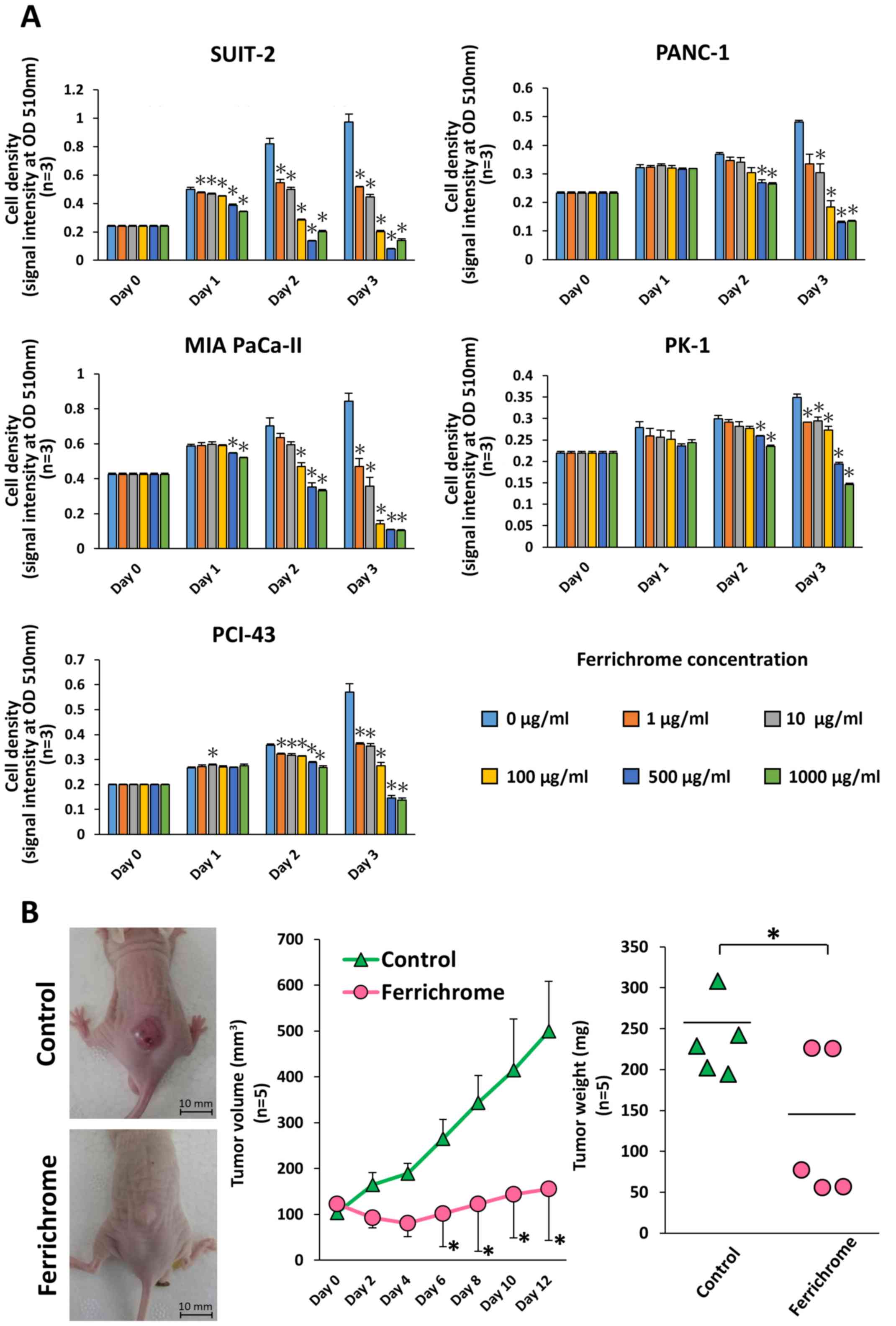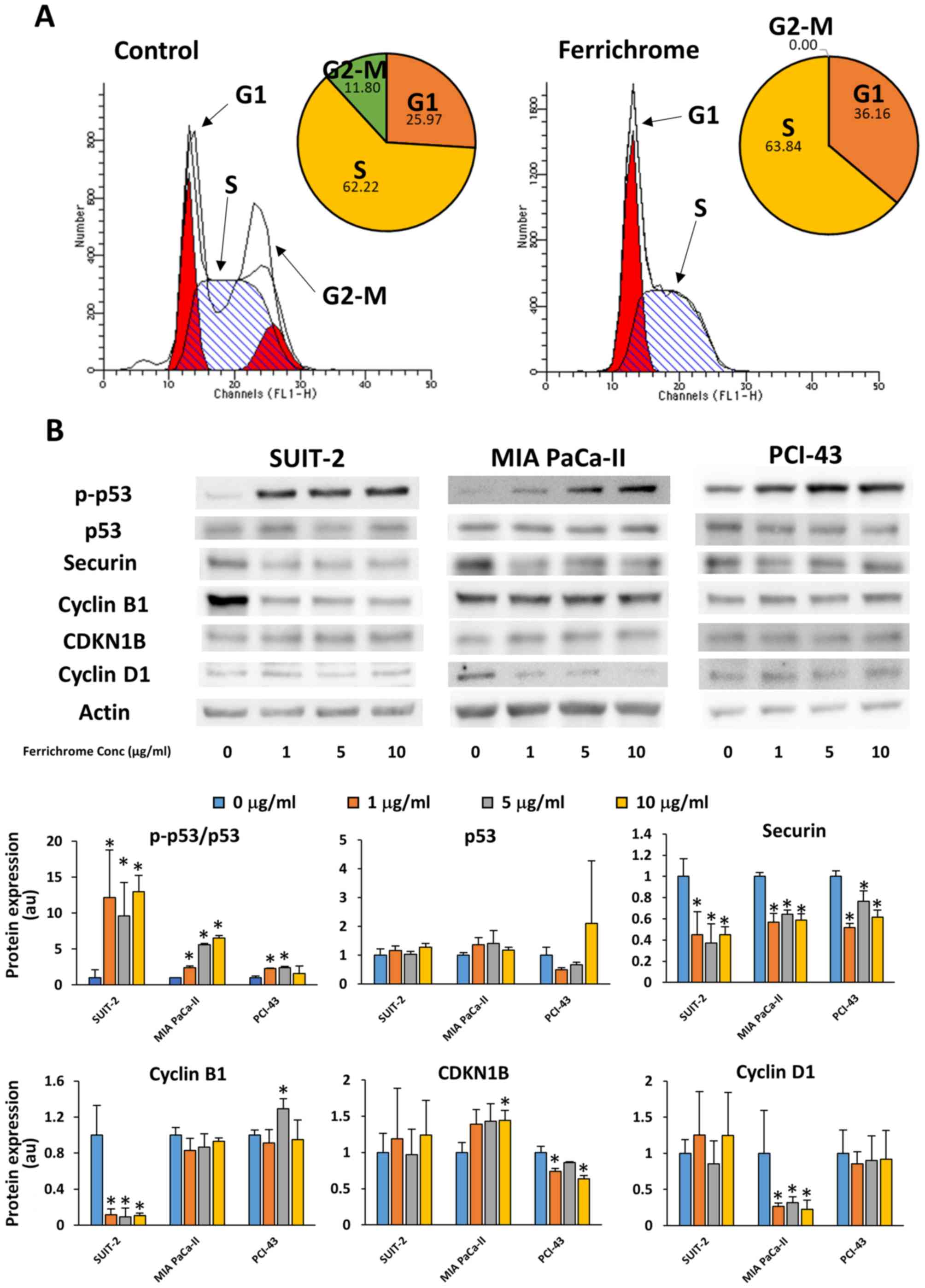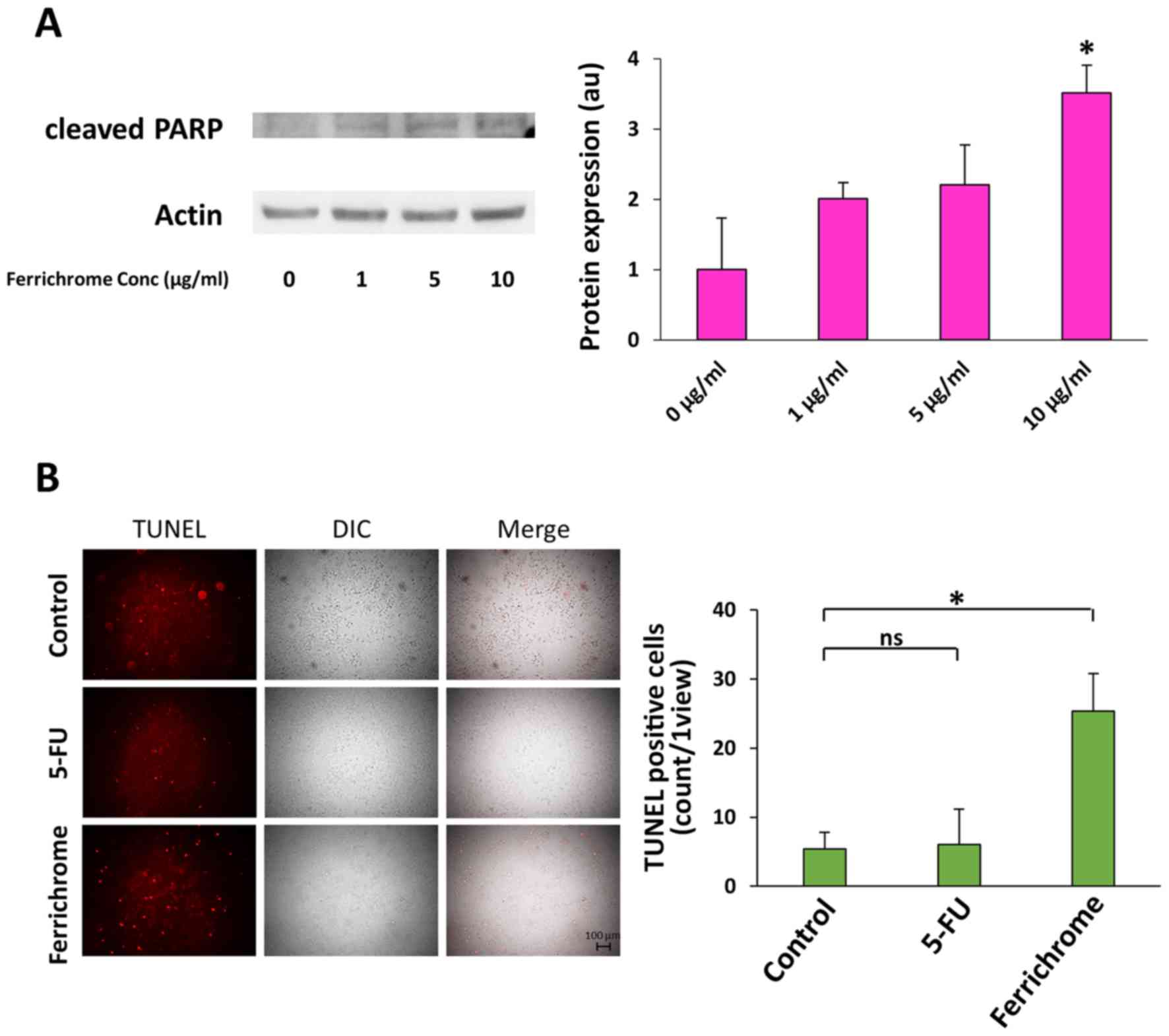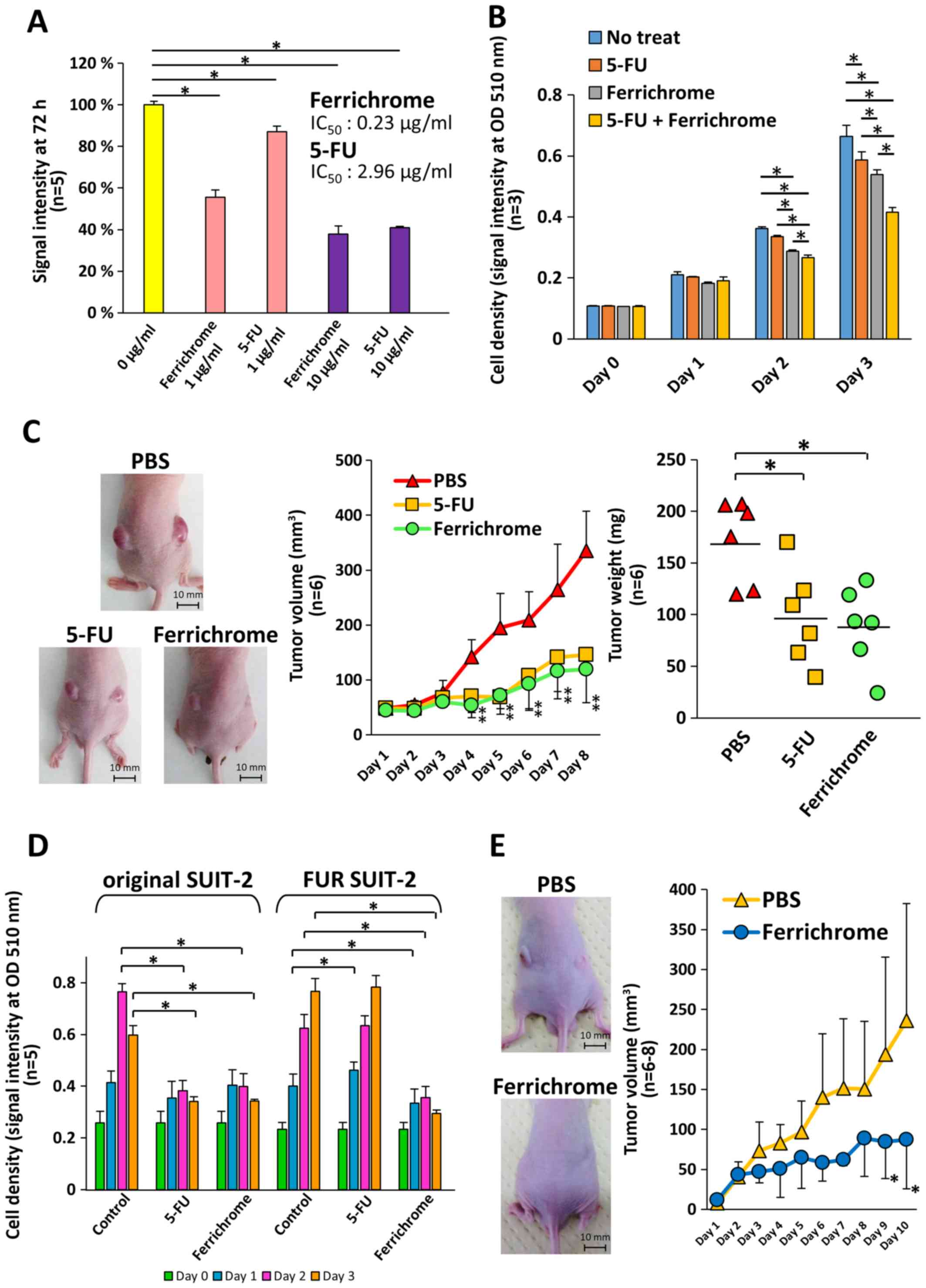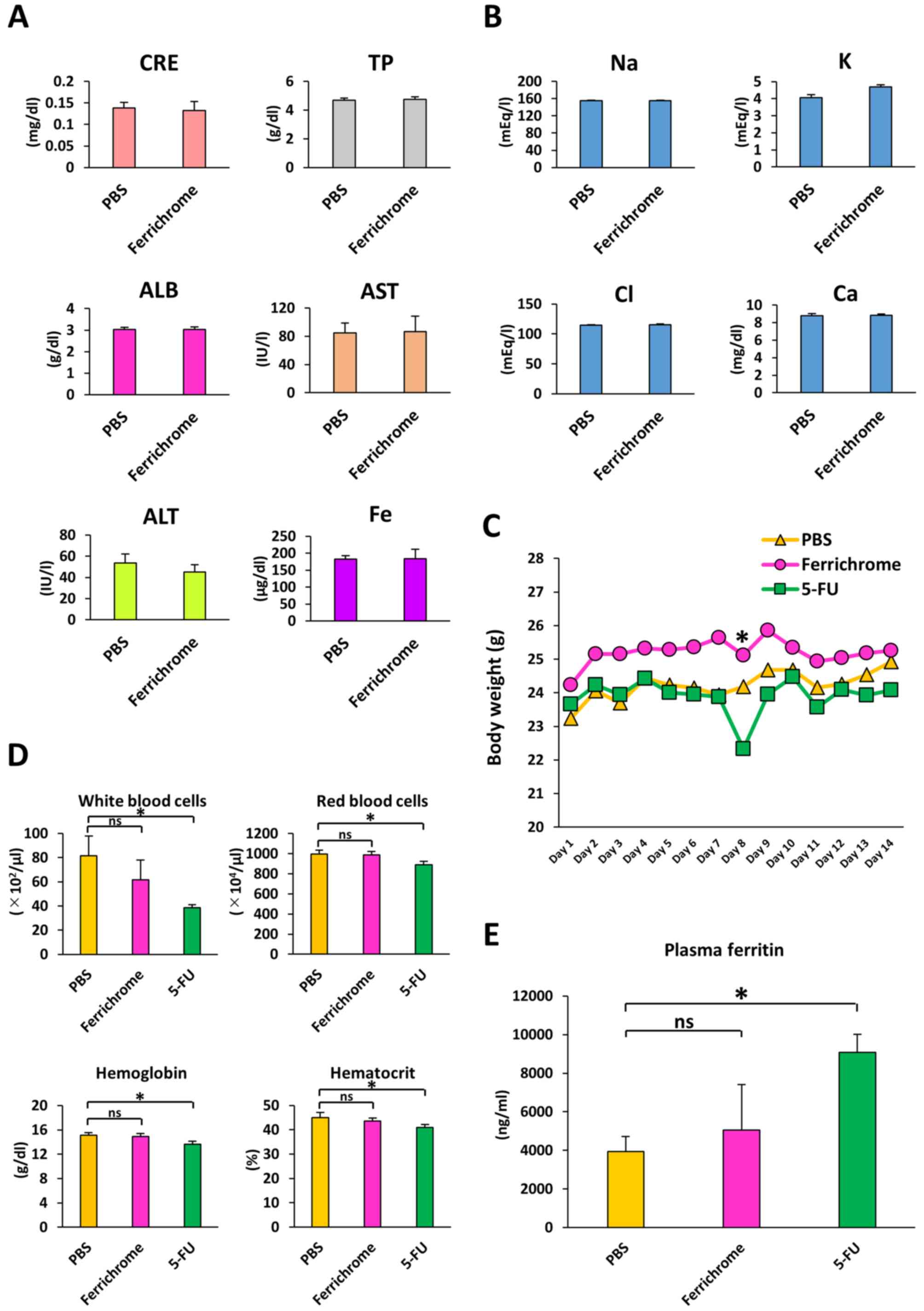|
1
|
Conroy T, Desseigne F, Ychou M, Bouché O,
Guimbaud R, Bécouarn Y, Adenis A, Raoul JL, Gourgou-Bourgade S, de
la Fouchardière C, et al Groupe Tumeurs Digestives of Unicancer;
PRODIGE Intergroup: FOLFIRINOX versus gemcitabine for metastatic
pancreatic cancer. N Engl J Med. 364:1817–1825. 2011. View Article : Google Scholar : PubMed/NCBI
|
|
2
|
Heinemann V, Boeck S, Hinke A, Labianca R
and Louvet C: Meta-analysis of randomized trials: Evaluation of
benefit from gemcitabine-based combination chemotherapy applied in
advanced pancreatic cancer. BMC Cancer. 8:822008. View Article : Google Scholar : PubMed/NCBI
|
|
3
|
Siegel RL, Miller KD and Jemal A: Cancer
statistics, 2016. CA Cancer J Clin. 66:7–30. 2016. View Article : Google Scholar : PubMed/NCBI
|
|
4
|
Chand S, O'Hayer K, Blanco FF, Winter JM
and Brody JR: The landscape of pancreatic cancer therapeutic
resistance mechanisms. Int J Biol Sci. 12:273–282. 2016. View Article : Google Scholar : PubMed/NCBI
|
|
5
|
Loehrer PJ Sr, Einhorn LH, Williams SD,
Hui SL, Estes NC and Pennington K: Cisplatin plus 5-FU for the
treatment of adeno-carcinoma of the colon. Cancer Treat Rep.
69:1359–1363. 1985.PubMed/NCBI
|
|
6
|
Gaiser RA, Halimi A, Alkharaan H, Lu L,
Davanian H, Healy K, Hugerth LW, Ateeb Z, Valente R, Fernández Moro
C, et al: Enrichment of oral microbiota in early cystic precursors
to invasive pancreatic cancer. Gut. 68:2186–2194. 2019. View Article : Google Scholar : PubMed/NCBI
|
|
7
|
Half E, Keren N, Reshef L, Dorfman T,
Lachter I, Kluger Y, Reshef N, Knobler H, Maor Y, Stein A, et al:
Fecal microbiome signatures of pancreatic cancer patients. Sci Rep.
9:168012019. View Article : Google Scholar : PubMed/NCBI
|
|
8
|
Food and Agriculture Organization of the
United Nations; World Health Organization: Guidelines for the
Evaluation of Probiotics in Food. Ontario, Canada: 2002
|
|
9
|
Gerritsen J, Smidt H, Rijkers GT and de
Vos WM: Intestinal microbiota in human health and disease: The
impact of probiotics. Genes Nutr. 6:209–240. 2011. View Article : Google Scholar : PubMed/NCBI
|
|
10
|
Kalliomäki M, Salminen S, Arvilommi H,
Kero P, Koskinen P and Isolauri E: Probiotics in primary prevention
of atopic disease: A randomised placebo-controlled trial. Lancet.
357:1076–1079. 2001. View Article : Google Scholar : PubMed/NCBI
|
|
11
|
Gu Y-H, Choi H, Yamashita T, Kang KM,
Iwasa M, Lee MJ, Lee KH and Kim CH: Pharmaceutical production of
anti-tumor and immune-potentiating Enterococcus faecalis-2001
β-glucans: Enhanced activity of macrophage and lymphocytes in
tumor-implanted mice. Curr Pharm Biotechnol. 18:653–661. 2017.
View Article : Google Scholar : PubMed/NCBI
|
|
12
|
Rowland IR, Rumney CJ, Coutts JT and
Lievense LC: Effect of Bifidobacterium longum and inulin on gut
bacterial metabolism and carcinogen-induced aberrant crypt foci in
rats. Carcinogenesis. 19:281–285. 1998. View Article : Google Scholar : PubMed/NCBI
|
|
13
|
Maroof H, Hassan ZM, Mobarez AM and
Mohamadabadi MA: Lactobacillus acidophilus could modulate the
immune response against breast cancer in murine model. J Clin
Immunol. 32:1353–1359. 2012. View Article : Google Scholar : PubMed/NCBI
|
|
14
|
Singhal B, Mukherjee A and Srivastav S:
Role of probiotics in pancreatic cancer prevention: The prospects
and challenges. Adv Biosci Biotechnol. 07:468–500. 2016. View Article : Google Scholar
|
|
15
|
Segawa S, Fujiya M, Konishi H, Ueno N,
Kobayashi N, Shigyo T and Kohgo Y: Probiotic-derived polyphosphate
enhances the epithelial barrier function and maintains intestinal
homeostasis through integrin-p38 MAPK pathway. PLoS One.
6:e232782011. View Article : Google Scholar : PubMed/NCBI
|
|
16
|
Hemarajata P and Versalovic J: Effects of
probiotics on gut microbiota: Mechanisms of intestinal
immunomodulation and neuromodulation. Therap Adv Gastroenterol.
6:39–51. 2013. View Article : Google Scholar : PubMed/NCBI
|
|
17
|
Tsai TL, Li AC, Chen YC, Liao YS and Lin
TH: Antimicrobial peptide m2163 or m2386 identified from
Lactobacillus casei ATCC 334 can trigger apoptosis in the human
colorectal cancer cell line SW480. Tumour Biol. 36:3775–3789. 2015.
View Article : Google Scholar : PubMed/NCBI
|
|
18
|
Sakatani A, Fujiya M, Ueno N, Kashima S,
Sasajima J, Moriichi K, Ikuta K, Tanabe H and Kohgo Y:
Polyphosphate derived from lactobacillus brevis inhibits colon
cancer progression through induction of cell apoptosis. Anticancer
Res. 36:591–598. 2016.PubMed/NCBI
|
|
19
|
Konishi H, Fujiya M, Tanaka H, Ueno N,
Moriichi K, Sasajima J, Ikuta K, Akutsu H, Tanabe H and Kohgo Y:
Probiotic-derived ferrichrome inhibits colon cancer progression via
JNK-mediated apoptosis. Nat Commun. 7:123652016. View Article : Google Scholar : PubMed/NCBI
|
|
20
|
Ijiri M, Fujiya M, Konishi H, Tanaka H,
Ueno N, Kashima S, Moriichi K, Sasajima J, Ikuta K and Okumura T:
Ferrichrome identified from Lactobacillus casei ATCC334 induces
apoptosis through its iron-binding site in gastric cancer cells.
Tumour Biol. 39:10104283177113112017. View Article : Google Scholar : PubMed/NCBI
|
|
21
|
Ecker DJ, Passavant CW and Emery T: Role
of two siderophores in Ustilago sphaerogena. Regulation of
biosynthesis and uptake mechanisms. Biochim Biophys Acta.
720:242–249. 1982. View Article : Google Scholar : PubMed/NCBI
|
|
22
|
Kato H, Ishikura H, Kawarada Y, Furuya M,
Kondo S, Kato H and Yoshiki T: Anti-angiogenic treatment for
peritoneal dissemination of pancreas adenocarcinoma: A study using
TNP-470. Jpn J Cancer Res. 92:67–73. 2001. View Article : Google Scholar : PubMed/NCBI
|
|
23
|
Li Z, Wang N, Huang C, Bao Y, Jiang Y and
Zhu G: Downregulation of caveolin-1 increases the sensitivity of
drug-resistant colorectal cancer HCT116 cells to 5-fluorouracil.
Oncol Lett. 13:483–487. 2017. View Article : Google Scholar : PubMed/NCBI
|
|
24
|
Moore JD: In the wrong place at the wrong
time: Does cyclin mislocalization drive oncogenic transformation?
Nat Rev Cancer. 13:201–208. 2013. View Article : Google Scholar : PubMed/NCBI
|
|
25
|
Leu JIJ, Pimkina J, Frank A, Murphy ME and
George DL: A small molecule inhibitor of inducible heat shock
protein 70. Mol Cell. 36:15–27. 2009. View Article : Google Scholar : PubMed/NCBI
|
|
26
|
Michaud DS, Izard J, Wilhelm-Benartzi CS,
You DH, Grote VA, Tjønneland A, Dahm CC, Overvad K, Jenab M,
Fedirko V, et al: Plasma antibodies to oral bacteria and risk of
pancreatic cancer in a large European prospective cohort study.
Gut. 62:1764–1770. 2013. View Article : Google Scholar
|
|
27
|
Fan X, Alekseyenko AV, Wu J, Peters BA,
Jacobs EJ, Gapstur SM, Purdue MP, Abnet CC, Stolzenberg-Solomon R,
Miller G, et al: Human oral microbiome and prospective risk for
pancreatic cancer: A population-based nested case-control study.
Gut. 67:120–127. 2018. View Article : Google Scholar
|
|
28
|
Pushalkar S, Hundeyin M, Daley D,
Zambirinis CP, Kurz E, Mishra A, Mohan N, Aykut B, Usyk M, Torres
LE, et al: The pancreatic cancer microbiome promotes oncogenesis by
induction of innate and adaptive immune suppression. Cancer Discov.
8:403–416. 2018. View Article : Google Scholar : PubMed/NCBI
|
|
29
|
Li S, Fuhler GM, Bn N, Jose T, Bruno MJ,
Peppelenbosch MP and Konstantinov SR: Pancreatic cyst fluid harbors
a unique microbiome. Microbiome. 5:1472017. View Article : Google Scholar : PubMed/NCBI
|
|
30
|
Sethi V, Kurtom S, Tarique M, Lavania S,
Malchiodi Z, Hellmund L, Zhang L, Sharma U, Giri B, Garg B, et al:
Gut microbiota promotes tumor growth in mice by modulating immune
response. Gastroenterology. 155:33–37.e6. 2018. View Article : Google Scholar : PubMed/NCBI
|
|
31
|
Kastan MB, Zhan Q, el-Deiry WS, Carrier F,
Jacks T, Walsh WV, Plunkett BS, Vogelstein B and Fornace AJ Jr: A
mammalian cell cycle checkpoint pathway utilizing p53 and GADD45 is
defective in ataxia-telangiectasia. Cell. 71:587–597. 1992.
View Article : Google Scholar : PubMed/NCBI
|
|
32
|
Kuerbitz SJ, Plunkett BS, Walsh WV and
Kastan MB: Wild-type p53 is a cell cycle checkpoint determinant
following irradiation. Proc Natl Acad Sci USA. 89:7491–7495. 1992.
View Article : Google Scholar : PubMed/NCBI
|
|
33
|
Bourdon JC, Renzing J, Robertson PL,
Fernandes KN and Lane DP: Scotin, a novel p53-inducible
proapoptotic protein located in the ER and the nuclear membrane. J
Cell Biol. 158:235–246. 2002. View Article : Google Scholar : PubMed/NCBI
|
|
34
|
Gu Z, Wang H, Xia J, Yang Y, Jin Z, Xu H,
Shi J, De Domenico I, Tricot G and Zhan F: Decreased ferroportin
promotes myeloma cell growth and osteoclast differentiation. Cancer
Res. 75:2211–2221. 2015. View Article : Google Scholar : PubMed/NCBI
|
|
35
|
Markkanen E, Dorn J and Hübscher U: MUTYH
DNA glyco-sylase: The rationale for removing undamaged bases from
the DNA. Front Genet. 4:182013. View Article : Google Scholar
|
|
36
|
Oka S, Leon J, Tsuchimoto D, Sakumi K and
Nakabeppu Y: MUTYH, an adenine DNA glycosylase, mediates p53 tumor
suppression via PARP-dependent cell death. Oncogenesis. 3:e121.
2014. View Article : Google Scholar : PubMed/NCBI
|
|
37
|
Ali S, Zhang Y, Zhou M, Li H, Jin W, Zheng
L, Yu X, Stark JM, Weitzel JN and Shen B: Functional deficiency of
DNA repair gene EXO5 results in androgen-induced genomic
instability and prostate tumorigenesis. Oncogene. 39:1246–1259.
2020. View Article : Google Scholar
|
|
38
|
Longley DB, Harkin DP and Johnston PG:
5-fluorouracil: Mechanisms of action and clinical strategies. Nat
Rev Cancer. 3:330–338. 2003. View Article : Google Scholar : PubMed/NCBI
|















